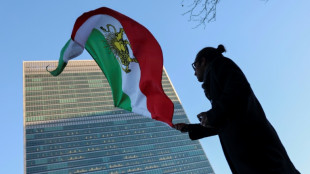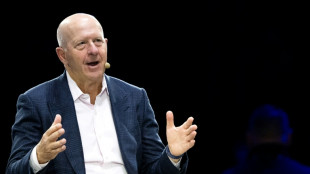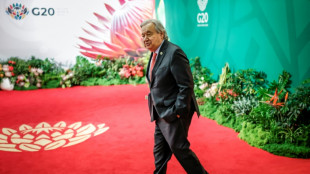
-
 Chiefs' Mahomes targets NFL 'Week 1' after knee surgery
Chiefs' Mahomes targets NFL 'Week 1' after knee surgery
-
Venezuelan interim leader vows oil sector reform after Maduro ouster

-
 Social media sites block 4.7 million underage accounts in Australia
Social media sites block 4.7 million underage accounts in Australia
-
US court clears Norway's Equinor to resume wind project halted by Trump

-
 Threats to Iran spike 'volatility': UN official
Threats to Iran spike 'volatility': UN official
-
Rabiot and AC Milan give Como French lesson to stay on Inter's heels

-
 US says reached deal with Taiwan to lower tariffs, boost investments
US says reached deal with Taiwan to lower tariffs, boost investments
-
South Korea's ex-leader Yoon faces first court verdict over martial law chaos

-
 'Gigantic explosion', fire in Dutch city of Utrecht, four hurt
'Gigantic explosion', fire in Dutch city of Utrecht, four hurt
-
Twenty-six charged in latest basketball gambling scandal

-
 Venezuela's Machado meets Trump for 'positive' talks despite snub
Venezuela's Machado meets Trump for 'positive' talks despite snub
-
NBA Europe 'must respect tradition', says commissioner Silver

-
 Thieves steal Pokemon cards in armed robbery at US store
Thieves steal Pokemon cards in armed robbery at US store
-
French Olympic champion Papadakis claims she was under partner's 'control'

-
 Fury over Grok sexualized images despite new restrictions
Fury over Grok sexualized images despite new restrictions
-
US says Iran halts executions as Gulf allies pull Trump back from strike

-
 Frank says Spurs taking 'small steps' in right direction
Frank says Spurs taking 'small steps' in right direction
-
Syrian activist Sarah Mardini acquitted of migrant trafficking in Greece

-
 Goldman Sachs' profits jump on hot merger market
Goldman Sachs' profits jump on hot merger market
-
Platini says Infantino has become 'more of an autocrat'

-
 Scottish Borders, Lake District to grace 2027 Tour de France
Scottish Borders, Lake District to grace 2027 Tour de France
-
Venezuela's sidelined Machado arrives at White House for Trump talks

-
 French mother superior bullied nuns at Paris order: inquiry
French mother superior bullied nuns at Paris order: inquiry
-
Cuba pays tribute to soldiers killed in Maduro capture

-
 UK politician joins hard-right Reform just hours after Tories sack him
UK politician joins hard-right Reform just hours after Tories sack him
-
'Gigantic explosion', fire in Dutch city, four hurt

-
 French mother superior bullied nuns at Paris convent - inquiry
French mother superior bullied nuns at Paris convent - inquiry
-
Deprived of heating, Kyiv enters survival mode to beat big freeze

-
 Oil prices slump after Trump eases concerns over Iran
Oil prices slump after Trump eases concerns over Iran
-
French mother superior bullied nuns in Montmartre: report

-
 Rosenior refuses to back Sanchez as Chelsea number one
Rosenior refuses to back Sanchez as Chelsea number one
-
Harry due to testify to UK court next week in last tabloid case

-
 Trump threatens to invoke Insurrection Act over Minnesota protests
Trump threatens to invoke Insurrection Act over Minnesota protests
-
Niger faces dilemma over uranium shipment stuck at airport

-
 UN chief attacks world leaders putting cooperation on 'deathwatch'
UN chief attacks world leaders putting cooperation on 'deathwatch'
-
Morocco and Senegal prepare for final showdown but Salah's AFCON dream fades

-
 Polls close in Uganda after delays, internet blackout
Polls close in Uganda after delays, internet blackout
-
Forced confession fears as Iran chief justice interrogates protesters

-
 Al-Attiyah closes on sixth Dakar Rally as Ekstrom wins 11th stage
Al-Attiyah closes on sixth Dakar Rally as Ekstrom wins 11th stage
-
Luis Enrique has no doubts about PSG's title credentials

-
 England off-spinner Bashir signs for Derbyshire after Ashes exile
England off-spinner Bashir signs for Derbyshire after Ashes exile
-
Trump convinced 'to give Iran a chance' after threats over protest crackdown

-
 European military mission in Greenland as US aim 'remains intact'
European military mission in Greenland as US aim 'remains intact'
-
UK's Hockney warns moving Bayeux Tapestry would be 'madness'

-
 Senior UK opposition politican sacked over 'plot' to join hard-right party
Senior UK opposition politican sacked over 'plot' to join hard-right party
-
Syrians flee Kurdish-controlled area near Aleppo

-
 Pressure piles on Musk's X to curb sexualised deepfakes
Pressure piles on Musk's X to curb sexualised deepfakes
-
Chinese dissident artist Ai Weiwei debuts in India

-
 Arbeloa must act fast to avert Real Madrid crisis
Arbeloa must act fast to avert Real Madrid crisis
-
Top Bangladesh cricket official sacked amid World Cup row


Robot fried chicken: entrepreneur seeks to improve S. Korea's favourite food
In fried-chicken-obsessed South Korea, restaurants serving the nation's favourite fast-food dish dot every street corner. But Kang Ji-young's establishment brings something a little different to the table: a robot is cooking the chicken.
Eaten at everything from tiny family gatherings to a 10-million-viewer live-streamed "mukbang" -- eating broadcast -- by K-pop star Jungkook of BTS fame, fried chicken is deeply embedded in South Korean culture.
Paired with cold lager and known as "chimaek" -- a portmanteau of the Korean words for chicken and beer -- it is a staple of Seoul's famed baseball-watching experience.
The domestic market -- the world's third largest, after the United States and China -- is worth about seven trillion won ($5.3 billion), but labour shortages are starting to bite as South Korea faces a looming demographic disaster due to having the world's lowest birth rate.
Around 54 percent of business owners in the food service sector report problems finding employees, a government survey last year found, with long hours and stressful conditions the likely culprit, according to industry research.
Korean fried chicken is brined and double-fried, which gives it its signature crispy exterior, but the process -- more elaborate than what is typically used by US fast food chains -- creates additional labour and requires extended worker proximity to hot oil.
Enter Kang, a 38-year-old entrepreneur who saw an opportunity to improve the South Korean fried chicken business model -- and the dish itself.
"The market is huge," Kang told AFP at her Robert Chicken franchise.
Chicken and pork cutlets are the most popular delivery orders in South Korea, and the industry could clearly benefit from more automation to "effectively address labour costs and workforce shortages", she said.
Kang's robot, composed of a simple, flexible mechanical arm, is capable of frying 100 chickens in two hours -- a task that would require around five people and several deep fryers.
But not only does the robot make chicken more efficiently -- it makes it more delicious, says Kang.
"We can now say with confidence that our robot fries better than human beings do," she said.
- Investing in 'foodtech' -
Already a global cultural powerhouse and major semiconductor exporter, South Korea last year announced plans to plough millions of dollars into a "foodtech" fund to help startups working on high-tech food industry solutions.
Seoul says such innovations could become a "new growth engine", arguing there is huge potential if the country's prowess in advanced robotics and AI technology could be combined with the competitiveness of Korean food classics like kimchi.
South Korea's existing foodtech industry -- including everything from next-day grocery delivery app Market Kurly to AI smart kitchens to a "vegan egg" startup -- is already worth millions, said food science professor Lee Ki-won at Seoul National University.
Even South Korea's Samsung Electronics -- one of the world's biggest tech companies -- is trying to get in on the action, recently launching Samsung Food, an AI-personalised recipe and meal-planning platform, available in eight languages.
Lee predicted South Korea's other major conglomerates are likely to follow Samsung into foodtech.
"Delivering food using electric vehicles or having robots directly provide deliveries within apartment complexes, known as 'metamobility', could become a part of our daily lives," he said.
"I am confident that within the next 10 years, the food tech industry will transform into the leading sector in South Korea."
- 'Initially struggled' -
Entrepreneur Kang now has 15 robot-made chicken restaurants in South Korea, and one branch in Singapore.
During AFP's visit to a Seoul branch, a robot meticulously handled the frying process -- from immersing chicken in oil, flipping it for even cooking, to retrieving it at the perfect level of crispiness, as the irresistible scent of crunchy chicken wafted through the shop.
Many customers remained oblivious to the hard-working robotic cook behind their meal.
Kim Moon-jung, a 54-year-old insurance worker, said she was not sure how a robot would make the chicken differently from a human "but one thing is certain -- it tastes delicious".
The robot can monitor oil temperature and oxidation levels in real time while it fries chicken, ensuring consistent taste and superior hygiene.
When Kang first started her business she "initially struggled" to see why anyone would use robots rather than human chefs.
But "after developing these technologies, I've come to realise that from a customer's perspective, they're able to enjoy food that is not only cleaner but also tastier", she told AFP.
Her next venture is a tip-free bar in Koreatown in New York City, where the cocktails will feature Korea's soju rice wine -- and will be made by robots.
Z.AbuSaud--SF-PST




